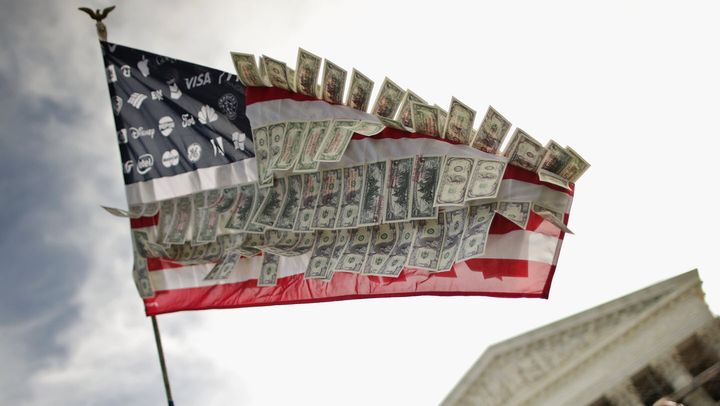Dozens of companies and trade associations put their political action committees’ donations on pause after 147 members of Congress objected to certifying the Electoral College results on Jan. 6, some to the objecting members and some to all political candidates. The moves were generally well received by those on the left, but some reformers are calling on corporations to go further if they want to show their commitment to democracy by pledging to shut off other avenues they can use for funneling money into politics, generally in much larger amounts than they can with their PACs.
Watchdog group Public Citizen spearheaded a letter to corporate America calling on companies to demonstrate their commitment to democracy by terminating their PACs, ceasing all super PAC donations, halting donations at the state and local levels, and more. “Instead of creating a list of insurrection-supporting or insurrection-enabling politicians, corporate America should use lessons from this episode as a basis to end their electioneering efforts, altogether,” the letter reads.
More than 50 organizations signed on. In addition to groups with missions to limit special interest money in politics, like Free Speech for People and End Citizens United, signers include religious groups like Adorers of the Blood of Christ and Faithful America, as well as investment companies Sorensen Ventures and Boston Common Asset Management.
“It’s high time for companies to take a hard look at the risks of continued corporate spending on elections,” said Josh Zinner, CEO of letter signer the Center on Corporate Responsibility. “While companies may perceive a short term gain from funneling money to elected officials, the reputational risk that they face and more critically, the corrosive effect on democracy of corporate money in politics should give them pause. January 6 should sound the alarm that it’s time to get corporate money out of politics.”
According to the letter, companies that want to show a commitment to democracy should immediately shut down their PACs, which “represent a low-level form of legalized bribery.” Corporate PACs, which are funded by donations from executives and employees, are a small portion of overall corporate money in politics, but they make up a significant part of fundraising for some politicians who tend to be among the most powerful and more pro-corporate. The top recipients of corporate PAC dollars in the last election cycle were corporate-friendly Democrats Rep. Richard Neal (Mass.), the powerful chair of the Ways and Means Committee, and Rep. Steny Hoyer (Md.), the House Majority Leader, according to data from the Center for Responsive Politics.
Companies should also stop all donations to super PACs, the letter says. Super PACs were officially allowed to exist following an advisory opinion request to the FEC from Democratic Party lawyer Marc Elias in the wake of the Citizens United decision and they are allowed to accept donations of any size from corporations. Some companies that have said they are pausing their PAC donations have recently made large super PAC donations from their corporate treasuries. For example, Marathon Petroleum, which told E&E News its PAC was doing an indefinite pause, donated $1 million last year to a super PAC affiliated with House Republicans called Congressional Leadership Fund. The company has not said it will pause its own donations to super PACs.
Donations to “dark money” political groups should also be ceased, according to the letter. Nonprofits that are allowed to spend money on politics but are not required by the FEC or IRS to identify their donors have been found to sometimes be funded by groups funded by major American corporations, and may often be funded by the corporations themselves. For example, a nonprofit called Center Forward, which funnels millions in dark money to its super PAC arm each cycle, receives funding from Comcast-linked NCTA and AT&T-linked CTIA, Sludge found by reading tax documents.
In twenty-eight states, corporations can give directly to politicians and do not have to use separate segregated funds, also known as PACs. The letter calls on companies to halt that activity. It also says that companies should disclose all money they contribute to trade associations and other third-party groups that work to influence policy. As Sludge has documented, many of the companies that said they are pausing their PAC spending are dues-paying members to trade groups that have PACs and have said nothing about stopping their political contributions. In some cases, those trade group PACs donated in the 2020 election cycle to members of Congress who objected to the Electoral College count.
“We will be monitoring whether companies respond to this call to shut down their political activity,” Public Citizen democracy advocate Rachel Curley told Sludge. “As we head into shareholder season, especially, we’ll be looking to see if any of the companies that made these commitments to suspend their PAC giving receive shareholder resolutions asking them to disclose their political activity.”
Read more from Sludge:

